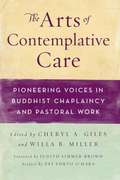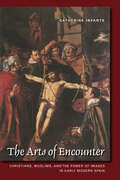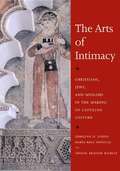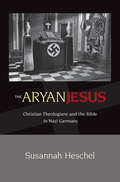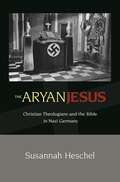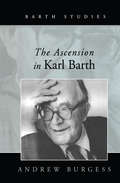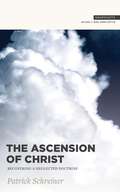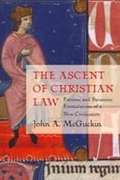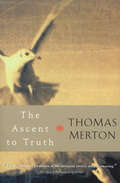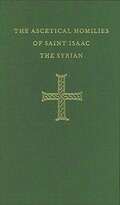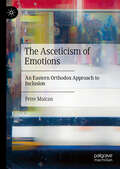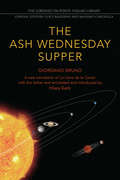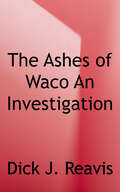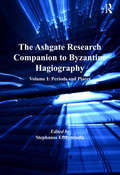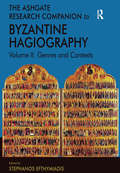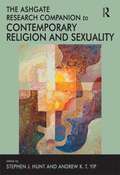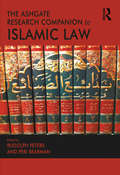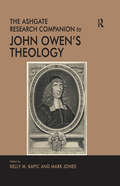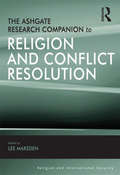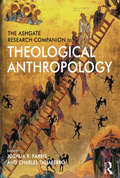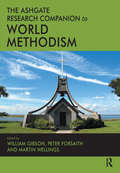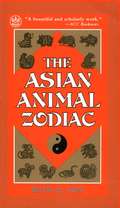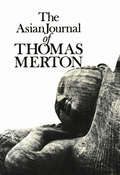- Table View
- List View
The Arts of Contemplative Care: Pioneering Voices in Buddhist Chaplaincy and Pastoral Work
by Cheryl A. Giles Willa B. MillerPowerful and Life-Affirming, this watershed volume brings together the voices of pioneers in the field of Buddhist contemplative care from hospices and hospitals to colleges, prisons, and the military. Each first-person essay offers a distillation of the wisdom gained over years of experience, and vividly shows the lived experience of each pastoral worker. The stories told here are sure to inspire-whether you are a professional caregiver or are simply called to serve through caregiving. Quite simply, this is a book that can change lives.
The Arts of EncounterThe Arts of Encounter: Christians, Muslims, and the Power of Images in Early Modern Spain (Toronto Iberic)
by Catherine InfanteImages of crosses, the Virgin Mary, and Christ, among other devotional objects, pervaded nearly every aspect of public and private life in early modern Spain, but they were also a point of contention between Christian and Muslim cultures. Writers of narrative fiction, theatre, and poetry were attuned to these debates, and religious imagery played an important role in how early modern writers chose to portray relations between Christians and Muslims. Drawing on a wide variety of literary genres as well as other textual and visual sources – including historical chronicles, travel memoirs, captives’ testimonies, and paintings – Catherine Infante traces the references to religious visual culture and the responses they incited in cross-confessional negotiations. She reveals some of the anxieties about what it meant to belong to different ethnic or religious communities and how these communities interacted with each other within the fluid boundaries of the Mediterranean world. Focusing on the religious image as a point of contact between individuals of diverse beliefs and practices, The Arts of Encounter presents an original and necessary perspective on how Christian-Muslim relations were perceived and conveyed in print.
The Arts of Intimacy: Christians, Jews, and Muslims in the Making of Castilian Culture
by Maria Rosa Menocal Jerrilynn D. Dodds Abigail Krasner BalbaleNamed a Book of the Year by the Times Literary Supplement, this lavishly illustrated work explores the vibrant interaction among different and sometimes opposing cultures, and how their contacts with one another transformed them all. It chronicles the tumultuous history of Castile in the wake of the Christian capture of the Islamic city of Tulaytula, now Toledo, in the eleventh century and traces the development of Castilian culture as it was forged in the new intimacy of Christians with the Muslims and Jews they had overcome. The authors paint a portrait of the culture through its arts, architecture, poetry and prose, uniquely combining literary and visual arts. Concentrating on the eleventh and twelfth centuries, the book reveals the extent to which Castilian identity is deeply rooted in the experience of confrontation, interaction, and at times union with Hebrew and Arabic cultures during the first centuries of its creation. Abundantly illustrated, the volume serves as a splendid souvenir of southern Spain; beautifully written, it illuminates a culture deeply enriched by others.
The Aryan Jesus: Christian Theologians And The Bible In Nazi Germany
by Susannah HeschelDuring the Third Reich, German Protestant theologians, motivated by racism and tapping into traditional Christian anti-Semitism, redefined Jesus as an Aryan and Christianity as a religion at war with Judaism. In 1939, these theologians established the Institute for the Study and Eradication of Jewish Influence on German Religious Life. In The Aryan Jesus, Susannah Heschel shows that during the Third Reich, the Institute became the most important propaganda organ of German Protestantism, exerting a widespread influence and producing a nazified Christianity that placed anti-Semitism at its theological center.
The Aryan Jesus: Christian Theologians and the Bible in Nazi Germany
by Susannah HeschelWas Jesus a Nazi? During the Third Reich, German Protestant theologians, motivated by racism and tapping into traditional Christian anti-Semitism, redefined Jesus as an Aryan and Christianity as a religion at war with Judaism. In 1939, these theologians established the Institute for the Study and Eradication of Jewish Influence on German Religious Life. In The Aryan Jesus, Susannah Heschel shows that during the Third Reich, the Institute became the most important propaganda organ of German Protestantism, exerting a widespread influence and producing a nazified Christianity that placed anti-Semitism at its theological center. Based on years of archival research, The Aryan Jesus examines the membership and activities of this controversial theological organization. With headquarters in Eisenach, the Institute sponsored propaganda conferences throughout the Nazi Reich and published books defaming Judaism, including a dejudaized version of the New Testament and a catechism proclaiming Jesus as the savior of the Aryans. Institute members--professors of theology, bishops, and pastors--viewed their efforts as a vital support for Hitler's war against the Jews. Heschel looks in particular at Walter Grundmann, the Institute's director and a professor of the New Testament at the University of Jena. Grundmann and his colleagues formed a community of like-minded Nazi Christians who remained active and continued to support each other in Germany's postwar years. The Aryan Jesus raises vital questions about Christianity's recent past and the ambivalent place of Judaism in Christian thought.
The Ascension in Karl Barth (Barth Studies)
by Andrew BurgessThis book explores the doctrine of ascension, and Barth's ascension thought in particular. First, it examines the doctrine of Jesus Christ's ascension into heaven, presenting a sustained discussion of Karl Barth's approach to this doctrine and the significance of the doctrine within his theology as a whole. Secondly, through examining Barth's ascension thought and dialoguing with three other theologians (Torrance, Farrow and Jenson), a clearer understanding of Barth and his theology is achieved. The treatment of issues related to Christ's ascension across a broader (protestant) perspective increases the relevance and usefulness of this unique study. Andrew Burgess presents the doctrine of the ascension as an important and undervalued doctrine and encourages Christians to see how, like Barth, they might benefit in their ability to think coherently about the present age and about Jesus in relation to this age, enabling further thought about the work of the Holy Spirit, the church, and Christian ethics.
The Ascension of Christ: Recovering a Neglected Doctrine (Snapshots)
by Patrick SchreinerIt's essential to the Gospel, but we rarely talk about it. The good news of Jesus includes his life, death, resurrection, and future return--but what about his ascension? Though often neglected or misunderstood, the ascension is integral to the gospel. In The Ascension of Christ, Patrick Schreiner argues that Jesus' work would be incomplete without his ascent to God's right hand. Not only a key moment in the Gospel story, Jesus' ascension was necessary for his present ministry in and through the church. Schreiner argues that Jesus' residence in heaven marks a turning point in his three-fold offices of prophet, priest, and king. As prophet, Jesus builds the church and its witness. As priest, he intercedes before the Father. As king, he rules over all. A full appreciation of the ascension is essential for understanding the Bible, Christian doctrine, and Christ's ongoing work in the world.
The Ascent of Christian Law: Patristic and Byzantine Formulations of a New Civilization
by John McGuckin<p>This work asks the question: What did Christianity do to build a civilization? In the present age, law has been used energetically to micro-manage human societies, values, and aspirations. But did l aw work that way in antiquity? <p>This little book is some form of answer. It is a book on law and legal thought as it emerged in its formative ages of the Christian past; it asks what the ancient writers and theorists did with law and legal thought. It is part history, part philosophy, and more than anything else an introduction to issues of law and legal adjudication in t he Patristic and Byzantine eras.</p>
The Ascent to Truth
by Thomas MertonThe author of The Seven Storey Mountain explores the mysticism of Saint John of the Cross.The only thing that can save the world from complete moral collapse is a spiritual revolution. . . . The desire for unworldliness, detachment, and union with God is the most fundamental expression of this revolutionary spirit. In Ascent to Truth, author and Trappist Monk Thomas Merton makes an impassioned case for the importance of contemplation. Drawing on a range of thinkers—from Carl Jung to Pope Pius XII—Merton defines the nature of contemplative experience and shows how the Christian mysticism of sixteenth-century Spanish Carmelite Saint John of the Cross offers essential answers to our disquieting and troubling times. &“For any who have the desire to look into meditation and contemplation . . . this is the book for which they have waited.&” —New York Herald Tribune Book Review &“For those who may be curious about mysticism, and for those who may be called to a life of contemplation, this is an excellent book.&” —Catholic World
The Ascetical Homilies Of Saint Isaac The Syrian
by IsaacThe Ascetical Homilies of Saint Isaac the Syrian
The Asceticism of Emotions: An Eastern Orthodox Approach to Inclusion
by Petre MaicanThis book delves into the profound challenges posed by the negative emotions—fear, pity, and disgust—that persons with atypical bodies often evoke in their non-disabled peers. It seeks to uncover the theological roots of these reactions and offers a transformative path for overcoming them. Drawing deeply from the ascetical tradition of the Eastern Orthodox Church, the book highlights centuries of rich insights into the dynamics of emotions and their spiritual transformation. By engaging with this tradition, the book provides a nuanced understanding of how emotions shape human perception and interaction, particularly in the context of disability. More than just an exploration of aesthetics, emotions, and asceticism, this work enriches the field of disability theology through a constructive dialogue with the Eastern Orthodox tradition. Long underrepresented in the discussions on disability, Eastern Orthodoxy reveals here its resources for reimagining inclusion and human dignity.
The Ash Wednesday Supper: A New Translation (Lorenzo Da Ponte Italian Library #4)
by Hilary Gatti Massimo Ciavolella/Luigi Ballerini Giordano BrunoGiordano Bruno’s The Ash Wednesday Supper is the first of six philosophical dialogues in Italian that he wrote and published in London between 1584 and 1585. It presents a revolutionary cosmology founded on the new Copernican astronomy that Bruno extends to infinite dimensions, filling it with an endless number of planetary systems. As well as opening up the traditional closed universe and reducing earth to a tiny speck in an overwhelmingly immense cosmos, Bruno offers a lively description of his clash of opinions with the conservative academics and theologians he argued with in Oxford and London. This volume, containing what has recently been claimed as the final version of Bruno’s Ash Wednesday Supper, presents a new translation based on a newly edited text, with critical comment that takes account of the most current discussion of the textual, historical, cosmological and philosophical issues raised in this dialogue. It considers Bruno’s work as a seminal text of the late European renaissance.
The Ashes of Waco: An Investigation
by Dick J. ReavisExamined from both sides - the Bureau of Alcohol and Tobacco and Firearms (ATF) and the FBI on one hand, and David Koresh and his followers on the other - this text focuses on the events at Mt. Carmel, near Waco Texas. <p><p>Dick J. Reavis contends that the government had little reason to investigate Koresh, and even less to raid the compound at Mt. Carmel. The government lied to the public about most of what happened - about who fired the first shots, about drugs allegations, and about the child abuse. The FBI was duplicitous and negligent in gassing Mt. Carmel - and that alone could have started the fire that killed 76 people. <p><p>Drawing on interviews with survivors of Koresh's movement (which dates back to 1935), as well as from esoteric religious tracts and audiotapes, and previously undisclosed government documents, Reavis uncovers the story of the burning at Waco, including the trial that followed. The author quotes from Koresh himself to create a portrait of a movement, an assault and an avoidable tragedy.
The Asheville Reader: The Medieval and Renaissance World
by Cynthia O. Ho John Mcclain Sheryl D. Sawin W. M. SpellmanThe Asheville Reader The Medieval and Renaissance World is a world history textbook for undergraduates.
The Ashgate Research Companion to Byzantine Hagiography: Volume I: Periods and Places
by Stephanos EfthymiadisFor an entire millennium, Byzantine hagiography, inspired by the veneration of many saints, exhibited literary dynamism and a capacity to vary its basic forms. The subgenres into which it branched out after its remarkable start in the fourth century underwent alternating phases of development and decline that were intertwined with changes in the political, social and literary spheres. The selection of saintly heroes, an interest in depicting social landscapes, and the modulation of linguistic and stylistic registers captured the voice of homo byzantinus down to the end of the empire in the fifteenth century. The seventeen chapters in this companion form the sequel to those in volume I which dealt with the periods and regions of Byzantine hagiography, and complete the first comprehensive survey ever produced in this field. The book is the work of an international group of experts in the field and is addressed to both a broader public and the scholarly community of Byzantinists, medievalists, historians of religion and theorists of narrative. It highlights the literary dimension and the research potential of a representative number of texts, not only those appreciated by the Byzantines themselves but those which modern readers rank high due to their literary quality or historical relevance.
The Ashgate Research Companion to Byzantine Hagiography: Volume II: Genres and Contexts
by Stephanos EfthymiadisFor an entire millennium, Byzantine hagiography, inspired by the veneration of many saints, exhibited literary dynamism and a capacity to vary its basic forms. The subgenres into which it branched out after its remarkable start in the fourth century underwent alternating phases of development and decline that were intertwined with changes in the political, social and literary spheres. The selection of saintly heroes, an interest in depicting social landscapes, and the modulation of linguistic and stylistic registers captured the voice of homo byzantinus down to the end of the empire in the fifteenth century. The seventeen chapters in this companion form the sequel to those in volume I which dealt with the periods and regions of Byzantine hagiography, and complete the first comprehensive survey ever produced in this field. The book is the work of an international group of experts in the field and is addressed to both a broader public and the scholarly community of Byzantinists, medievalists, historians of religion and theorists of narrative. It highlights the literary dimension and the research potential of a representative number of texts, not only those appreciated by the Byzantines themselves but those which modern readers rank high due to their literary quality or historical relevance.
The Ashgate Research Companion to Contemporary Religion and Sexuality
by Andrew K.T. YipThe Ashgate Research Companion to Contemporary Religion and Sexuality provides academics and students with a comprehensive and authoritative state-of-the-art review of current research in the area of sexuality and religion, broadly defined. This collection of expert essays offers an inter-disciplinary study of the important aspects of sexuality and religion, calling upon sociological, cultural, historical and theological contributions to an under-researched subject. The Companion focuses on the exploration of diverse religious faiths, spiritualities, and sexualities with contributions that embrace many contrasting approaches related to the contemporary context. By adopting a truly inter-disciplinary and multi-dimensional perspective, the Companion embraces the complexities of both sexuality and religion. Aimed primarily at a readership with specialist interest in both, The Ashgate Research Companion to Contemporary Religion and Sexuality offers an innovative and refreshing analysis of key theoretical and empirical issues in an increasingly relevant and expanding area of academic interest. The Companion comprises five main thematic sections, each with chapters ranging across a variety of crucial topics traversing various faith traditions. The principal themes are: epistemological and methodological issues; the significance of religious text; institutional religious settings; stability transformation and change; contesting hegemonic structures and discourses. Each section includes four chapters contributed by leading international experts in their respective fields and who are at the cutting-edge of current research. Collectively, they offer an inter-disciplinary and comprehensive survey of sexuality and religion.
The Ashgate Research Companion to Islamic Law
by Peri BearmanThis unparalleled Companion provides a comprehensive and authoritative guide to Islamic law to all with an interest in this increasingly relevant and developing field. The volume presents classical Islamic law through a historiographical introduction to and analysis of Western scholarship, while key debates about hot-button issues in modern-day circumstances are also addressed. In twenty-one chapters, distinguished authors offer an overview of their particular specialty, reflect on past and current thinking, and point to directions for future research. The Companion is divided into four parts. The first offers an introduction to the history of Islamic law as well as a discussion of how Western scholarship and historiography have evolved over time. The second part delves into the substance of Islamic law. Legal rules for the areas of legal status, family law, socio-economic justice, penal law, constitutional authority, and the law of war are all discussed in this section. Part three examines the adaptation of Islamic law in light of colonialism and the modern nation state as well as the subsequent re-Islamization of national legal systems. The final section presents contemporary debates on the role of Islamic law in areas such as finance, the diaspora, modern governance, and medical ethics, and the volume concludes by questioning the role of Sharia law as a legal authority in the modern context. By outlining the history of Islamic law through a linear study of research, this collection is unique in its examination of past and present scholarship and the lessons we can draw from this for the future. It introduces scholars and students to the challenges posed in the past, to the magnitude of milestones that were achieved in the reinterpretation and revision of established ideas, and ultimately to a thorough conceptual understanding of Islamic law.
The Ashgate Research Companion to John Owen's Theology
by Mark Jones Kelly M. KapicJohn Owen (1616-1683) is regarded as one of the greatest theologians Britain ever produced. Owen has had an important historical and theological influence, and his significance is widely recognized today. As a revival in Owen studies and reprints has taken place, this much-needed companion by an international group of leading scholars, helpfully explores key questions related to Owen's method, theology, and pastoral practice. Examining his thought through such topics as his epic work on the Holy Spirit, his developed view of faith and reason, and his contribution to the place of toleration, this book offers an authoritative exploration of one of Britain's greatest theologians.
The Ashgate Research Companion to Religion and Conflict Resolution (Religion And International Security Ser.)
by Lee MarsdenA comprehensive overview of the latest research in religion and conflict resolution, this collection of twenty three essays brings together leading scholars in the field examining the contribution religious actors have made and are making towards peace and resolving. The Ashgate Research Companion to Religion and Conflict Resolution is primarily aimed at readerships with special interest in conflict resolution, international security, and religion and international relations, and will also serve as a valuable resource for policy makers and conflict resolution practitioners. The collection comprises five thematic sections, each with chapters on vital and mainly contemporary topics in the field of religion and conflict resolution. The principal themes include: ¢
The Ashgate Research Companion to Theological Anthropology
by Charles Taliaferro Joshua R. FarrisIn recent scholarship there is an emerging interest in the integration of philosophy and theology. Philosophers and theologians address the relationship between body and soul and its implications for theological anthropology. In so doing, philosopher-theologians interact with cognitive science, biological evolution, psychology, and sociology. Reflecting these exciting new developments, The Ashgate Research Companion to Theological Anthropology is a resource for philosophers and theologians, students and scholars, interested in the constructive, critical exploration of a theology of human persons. Throughout this collection of newly authored contributions, key themes are addressed: human agency and grace, the soul, sin and salvation, Christology, glory, feminism, the theology of human nature, and other major themes in theological anthropology in historic as well as contemporary contexts.
The Ashgate Research Companion to World Methodism (Routledge Methodist Studies Series)
by William Gibson Peter Forsaith Martin WellingsAs a religious and social phenomenon Methodism engages with a number of disciplines including history, sociology, gender studies and theology. Methodist energy and vitality have intrigued, and continue to fascinate scholars. This Companion brings together a team of respected international scholars writing on key themes in World Methodism to produce an authoritative and state-of-the-art review of current scholarship, mapping the territory for future research. Leading scholars examine a range of themes including: the origins and genesis of Methodism; the role and significance of John Wesley; Methodism’s emergence within the international and transatlantic evangelical revival of the Eighteenth-Century; the evolution and growth of Methodism as a separate denomination in Britain; its expansion and influence in the early years of the United States of America; Methodists’ roles in a range of philanthropic and social movements including the abolition of slavery, education and temperance; the character of Methodism as both conservative and radical; its growth in other cultures and societies; the role of women as leaders in Methodism, both acknowledged and resisted; the worldwide spread of Methodism and its enculturation in America, Asia and Africa; the development of distinctive Methodist theologies in the last three centuries; its role as a progenitor of the Holiness and Pentecostal movements, and the engagement of Methodists with other denominations and faiths across the world. This major companion presents an invaluable resource for scholars worldwide; particularly those in the UK, North America, Asia and Latin America.
The Asian Animal Zodiac
by Norma Sun Ruth Q. SunIn much the same way that Westerners analyze their personalities and predict their futures by studying the positions of the stars under which they were born, Asians use the ancient animal zodiac to explain individual personalities and predict their futures. According to legend, the twelve years in the Asian animal cycles were named for the twelve animals who visited Buddha on his deathbed: the rat, ox, tiger, hare, dragon, snake, horse, ram, monkey, cock, dog, and boar. This informative and delightful book examines each animal of the zodiacal cycle and describes its history, its virtues and flaws, its "all-too-human characteristics." Traditional tales from China, Japan, Korea, Tibet, and Vietnam illustrate each animal's personality as the people of those nations see it.
The Asian Animal Zodiac
by Norma Sun Ruth Q. SunIn much the same way that Westerners analyze their personalities and predict their futures by studying the positions of the stars under which they were born, Asians use the ancient animal zodiac to explain individual personalities and predict their futures. According to legend, the twelve years in the Asian animal cycles were named for the twelve animals who visited Buddha on his deathbed: the rat, ox, tiger, hare, dragon, snake, horse, ram, monkey, cock, dog, and boar. This informative and delightful book examines each animal of the zodiacal cycle and describes its history, its virtues and flaws, its "all-too-human characteristics." Traditional tales from China, Japan, Korea, Tibet, and Vietnam illustrate each animal's personality as the people of those nations see it.
The Asian Journal of Thomas Merton
by Thomas Merton James Laughlin Naomi Burton Stone Patrick Hart Amiya Chakravarty"This is quintessential Merton."--The Catholic Review. "The moment of takeoff was ecstatic...joy. We left the ground--I with Christian mantras and a great sense of destiny, of being at last on my true way after years of waiting and wondering..." With these words, dated October 15. 1968, the late Father Thomas Merton recorded the beginning of his fateful journey to the Orient. His travels led him from Bangkok, through India to Ceylon, and back again to Bangkok for his scheduled talk at a conference of Asian monastic orders. There he unequivocally reaffirmed his Christian vocation. His last journal entry was made on December 8, 1968, two days before his untimely, accidental death. Amply illustrated with photographs he himself took along the way and fully indexed, the book also contains a glossary of Asian religious terms, a preface by the Indian scholar Amiya Chakravarty, a foreword and postscript by Brother Patrick Hart of the Abbey of Gethsemani, as well as several appendices, among them the text of Merton's final address.
